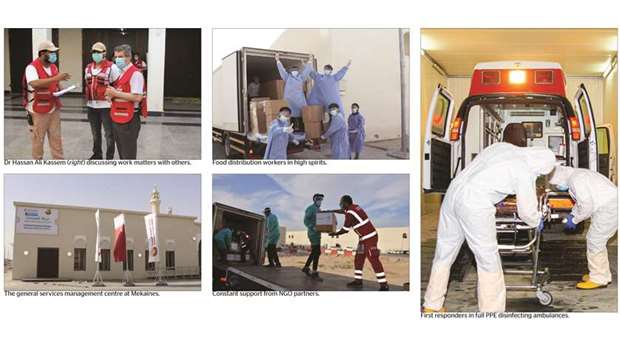Qatar Red Crescent Society (QRCS) has received some 50,000 workers – including 12,000 suspected and 38,000 confirmed Covid-19 cases – since it was assigned by the Ministry of Public Health (MoPH) in late March to operate the Mekaines quarantine and isolation facility for workers.
This has been highlighted by Dr Hassan Ali Kassem, chief medical officer at the QRCS Medical Affairs Division, in a press statement.
“The medical services at Mekaines start at the very point when the guests arrive by buses to the reception point, which is open 24/7. It is a large, well-protected hall designed to receive new patients,” he said. “The medical staff there register the personal data of guests into the system and conduct the triage process according to certain criteria to determine who is to be admitted and who are to be referred to other isolation places for more specialised medical care.”
These criteria include age, chronic diseases (such as diabetes, hypertension, cardiothoracic problems, renal failure or autoimmune disorders), and severe respiratory symptoms like difficulty in breathing or acute cough. Everything is co-ordinated with the Covid-19 System-Wide Incident Command Committee (SWICC), he said.
“We make sure that every patient has the Ehteraz app on their smartphone. For those who do not, we help them download and install it. We also double-check the swab results to make sure that all of them are positive (correct). Then, each patient is given a hygiene kit and a card with block number, villa number and room number. Finally, the new admissions are transported by buses to their accommodations in the Red Zone,” Dr Kassem explained.
He said every patient is asked about his preferred diet (vegetarian, Asian, Arabic, etc.) and rituals of worship to respect their cultural and religious backgrounds. Those with similar nationalities are accommodated together to ensure familiarity and socialisation, he added.
Dr Kassem noted that the accommodation period is 14 days on an average. Each block is divided into four zones, each with a medical clinic where a general practitioner and nurse are stationed to conduct regular examinations for patients in the Red Zone. The medical professionals wear full personal protective equipment (PPE) and all the medical devices and consumables remain inside the clinic. Medical examinations and medicines are given to the patients for free.
In case of emergency, he said, there is a phone and WhatsApp number that can be used by the patients to call the doctor 24/7, or they can call the hotline, 16006, or talk to the nearest guard at the zone’s gate. With regard to psychological support and health education, Dr Kassem said a specialised team holds daily activities to improve the morale of the quarantined guests.
As per the SWICC instructions, a list of those eligible for discharge is prepared on a day-to-day basis after making sure that they have completed 14 days in isolation, are in good health, and have the Ehteraz app activated. Every day in the afternoon, the discharged workers are transported by buses to their respective homes, where they are required to stay in self-isolation for an additional seven days. After that, they can resume their normal lives.
The Mekaines facility began with small numbers (around 3,000 guests) and expanded gradually to accommodate, at some point, as many as 12,000 quarantined persons, he said. “First, it had been intended for quarantine, but early in May, it was transformed into an isolation centre for confirmed infections. To meet the increasing demand, QRCS brought around 150 physicians, nurses and technicians to provide medical services at Mekaines,” according to Dr Kassem.
“I would like to thank those who supported us in this great work, including the MoPH, Hamad Medical Corporation, the Ministry of Interior, Ministry of Administrative Development, Labour and Social Affairs, government organisations, NGOs, companies and individuals. This could only happen with the efforts of all QRCS staff and volunteers, who were dedicated enough to stay at Mekaines all the time to meet the needs of the inmates,” Dr Kassem concluded.

..
